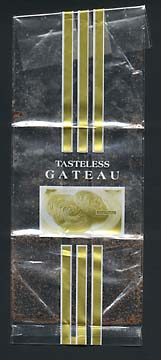

|
I guess they were thinking TastyKake but it lost something in the translation -- like taste! This is actually pretty typical. Korean advertisers and manufacturers tend to use English the way US ad copywriters use French or Italian -- they're trying to make the product seem exotic. (But how exotic is TastyKake?) Unfortunately, or fortunately, depending on your point of view, English and Korean are very different languages with different origins. The ad copywriters must not have native English speakers on their staffs, because often the "Konglish" results land somewhere between bizarre and hilarious.
|